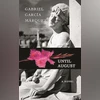Until August
Author: Gabriel García Márquez
Translator: Anne McLean
Publisher: Knopf
Price: $22
Also Read
Pages: 129
By Michael Greenberg
Billed as a “rediscovered” novel, Until August is likely to be the last published book of fiction by the Colombian master and Nobel laureate Gabriel García Márquez. It would be hard to imagine a more unsatisfying goodbye from the author of One Hundred Years of Solitude (1967), the book that threw open the doors of Latin American literature. Until August, nimbly translated by Anne McLean, is a microscopic story, its contents hardly sufficient for it to be called a novella, much less a finished novel. Reading it may provoke unhealthy levels of frustration in those familiar with García Márquez’s most indelible creations.
Readers’ inevitable disappointment with Until August may be directed partly at García Márquez’s two sons and literary executors, who permitted its publication even though their father had made his wishes clear. “This book doesn’t work,” he told them. “It must be destroyed.” He finished his fifth, and final, draft in late 2004, when he was 77, around the time his memory commenced the merciless process of disappearing.
Now, 10 years after his death, his executors appear to have overrated the story’s value, possibly as a result of sentimental admiration for their father. In a brief preface they strike a note of doubt, calling Until August “the fruit of one last effort to carry on creating against all odds.” They concede that it is not “as polished as his greatest books,” but excuse their “act of betrayal” with the explanation “that the fading faculties that kept him from finishing the book also kept him from realising how good it was.” None of his editors or long-time publishers appears to have thought of protecting him or acknowledging the manuscript’s vapidity.
What is most jarring is that the story has all the hallmarks of García Márquez; despite its deficiencies, the writing is unmistakably his. At its centre is Ana Magdalena Bach, who is a virgin when she marries and remains contentedly faithful to her husband until, at 46, she embarks on a series of explosive one-night stands, a new one each year. She meets the men, all of them strangers, during solo visits to the Caribbean island where her mother is buried. Without fail, every August 16 she lays a bouquet of fresh gladioli on her mother’s grave, clears the weeds that have sprung up around the stone and quickly fills her mother in on the latest family news. Then she gets down to the serious business of finding a partner until morning, when a ferry will take her back to the mainland.
Her first tryst is with a silver-haired “Hispanic gringo” she picks up at her hotel bar. The sex is impersonal and, for Ana, immensely exciting: She “devoured him for her own pleasure not even thinking of his.” The next morning she’s appalled to discover he left her a $20 bill. The insult infuriates her and she is tormented by both a wish for revenge and the desire to repeat the evening.
Revenge never comes, but Ana does get to repeat her ecstasy. Most of these meetings would be at home in the pages of any number of bodice-ripping romances. The men become indistinguishable as the story progresses. They are all “exquisite” in bed, except for one who, after removing her clothes with a “magician’s mastery,” is rough enough to make her feel “as if she were a calf being carved up.” Nevertheless, he doesn’t fail to put her in a state of “inconceivable pleasure.”
More interesting are the unpredictable emotions that overcome Ana when she returns from the island to her family. Her infidelities roil the well-matched calm of her 27-year marriage. She grows broodingly distant from her husband, and then, in a storm of jealousy, becomes convinced that he is the one cheating on her. Unfortunately, the husband is a skeletal character and García Márquez can’t do more than gesture at these contradictory emotions.
Reading Until August is a bit like watching a great dancer, well past his prime, marking his ineradicable elegance in a few moves he can neither develop nor sustain. This is most keenly felt in the second half, when the author’s command of his subject slips and the story rushes to its hackneyed conclusion. One can almost pinpoint the place where the thread attaching author to subject unravels, as he repeats tropes and images, and the generation of new material falls beyond his grasp.
García Márquez’s work has survived legions of imitators who have misunderstood magic realism as a stylistic mannerism rather than the means to a sharper, less omniscient reality. Much of what is thought of as “magical” in his novels reflects life as his characters believed it to be in the Caribbean towns he so vividly described. Now, his literary guardians have put in front of the world the indignity of García Márquez imitating himself. Luckily, his intelligence and exceptional use of language have ensured that his best work remains undiminished. If you’re unfamiliar with that work, a feast of originality and sheer inventiveness awaits you. The value of Until August may ultimately be to give readers the chance to mourn anew the passing of a beloved writer.
The reviewer is the author of Hurry Down Sunshine and Beg, Borrow, Steal: A Writer’s Life
©2024 The New York TimesNews Service

)
